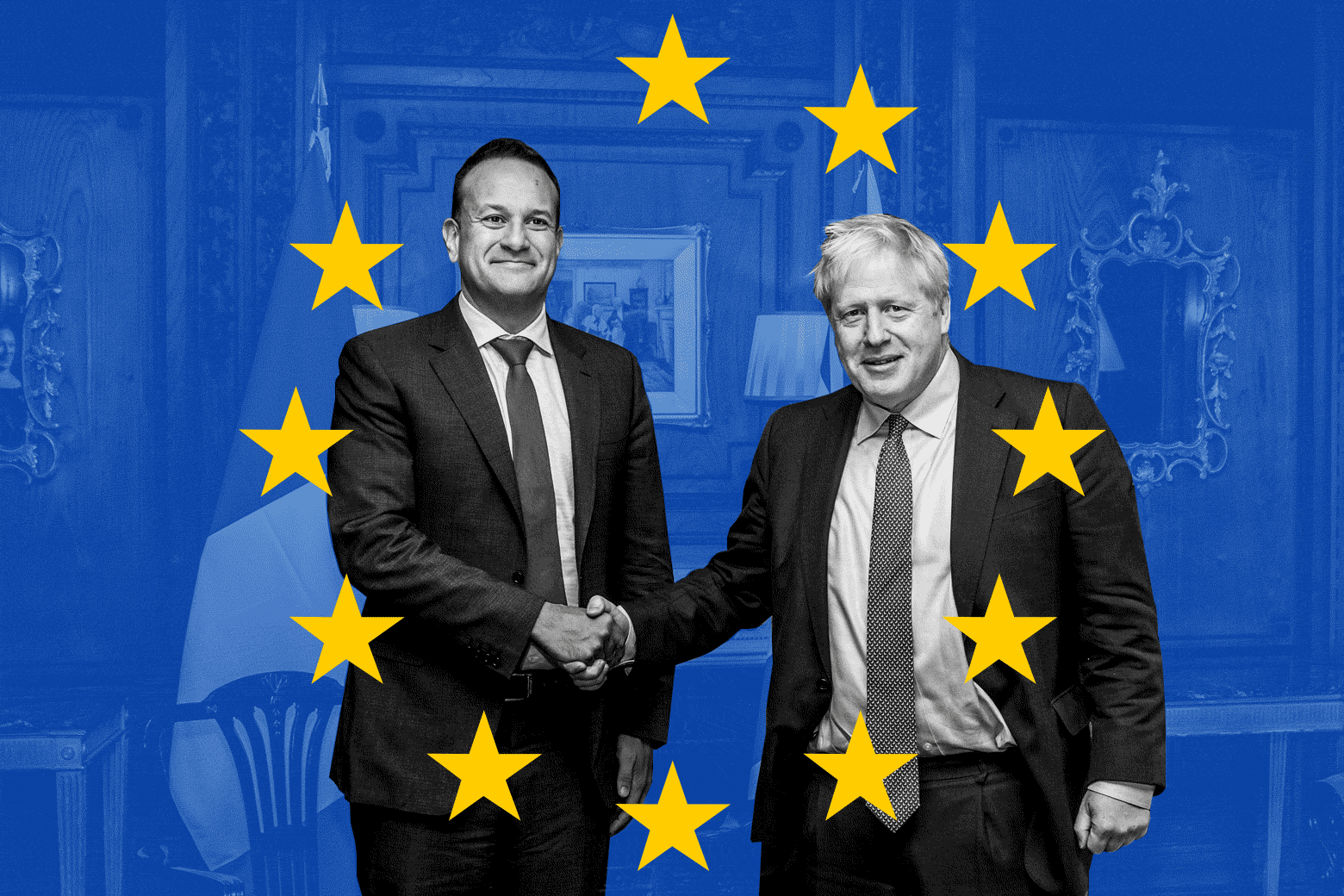Animation by Lisa Larson-Walker. Photo by Noel Mullen/Pool/AFP/Getty Images.
Negotiators are entering “the tunnel” this week for the final stretch of Brexit negotiations before the Oct. 31 deadline, which is Brussels jargon for intensive talks during which leaks are kept to a minimum, as opposed to normal circumstances, when apparently they don’t take things that seriously and leak all the time. As far as I can tell, there’s not a literal tunnel. It’s a useful metaphor for Brexit as a whole though: a long dark shaft that feels as if it has no end, or before you get to the end, they just keep building more tunnel. Also, trucks are backed up and the drivers are getting bored and engaging in public sex acts.
I’ll explain that part in a bit. Just roll with it.
This week in good news: The EU and the UK agreed to extend talks on reaching a new withdrawal agreement. This is an improvement in tone from last week, when EU leaders were extremely unimpressed with Prime Minister Boris Johnson’s “final” offer to resolve the pesky Irish border issue.
The vibes improved after Johnson met with Irish Taoiseach (prime minister) Leo Varadkar on Thursday at a manor house in Northwest England. After a two-hour meeting including a one-on-one stroll through the manor grounds, the Irish leader said he could “see a pathway to a possible deal” and that enough progress had been made for talks to continue. “I have received promising signals from the Taoiseach that a deal a still possible,” said European Council leader Donald Tusk.
Johnson and the Europeans had been at odds over his insistence that the UK, including Northern Ireland, leave the EU customs union, which would require customs checks on the island of Ireland, something the Republic of Ireland deeply opposes. According to one European diplomat quoted by Reuters, Johnson has now “admitted that the solution cannot result in the creation of a border in Ireland.” The pound jumped to its highest levels of the Johnson era following the news.
This week in bad news: It’s still not clear how Johnson plans to finesse the border issue, given that Brexiteers (including him) balked three times at Theresa May’s plan to keep the UK in a customs union. Also, since Johnson has firmly ruled out asking for an extension—as British law currently requires him to do if he hasn’t reached a new deal by Oct. 19—the time to negotiate is vanishingly small. After a Tuesday morning call between Johnson and German Chancellor Angela Merkel, a source at 10 Downing Street told the BBC that a Brexit deal by the end of the month is “essentially impossible.”
Despite the friendly chat between Johnson and Varadkar, what’s probably really going on now is that leaders on both sides want to demonstrate to their voters that they did everything possible to reach a deal before it proves to be ultimately impossible in just over a week.
This week in having to work on weekends: Johnson has called for an emergency session of parliament on Oct. 19. Given all the historic firsts we’ve seen in Brexit, the news that, as the Financial Times lede excitedly put it, “This will be the first time the Commons has met on a Saturday since April 3, 1982 at the start of the Falklands crisis,” doesn’t feel that mind-blowing. But it’s still going to be very worth watching.
If Johnson reaches a deal with the Europeans—a pivotal European Council summit will take place right before the session—this will be his last day to get it approved by parliament, under the legislation passed last month known as the Benn Act. If he doesn’t get a deal, he has said he is very willing to take the UK out without a deal, but the Benn Act seeks to prevent this by requiring him to write a letter to the EU asking for an extension until the end of January. Johnson has said he will comply with the law, but he will not extend Brexit. (He would rather be “dead in a ditch,” as he put it.)
How does that work? There’s all manner of shenanigans that have been suggested, including Johnson writing a second letter that telling the EU that he didn’t really mean what he said in the first one, or convincing a European leader to reject the request. (The French, who have made very clear to everyone how sick they’re getting of all this, might be amenable.) Johnson could also find some pretext for not complying with the law at all, which would set up a court challenge that could last until after the Oct. 31 deadline. Whatever happens, there’s going to be drama.
This week in horny lorries: Yes, sure, there could be mass unrest and shortages of fresh food and medicine. But a far more insidious no-deal Brexit threat was made public this week: horny truckers.
One cabinet minister told the Times this week that, in the event of a no-deal Brexit, a side effect of the likely delays at the port city of Kent would be that bored truck drivers would visit “sex sites” while they wait for their paperwork to clear. “The main thing is whether they will turn up at the Channel ports with the right paperwork. But there are also dogging hotspots all over the place,” the minister said.
In case, like me, your innocent American ears had never heard of “dogging,” it’s English slang for either engaging in sex acts in public or watching others do so. It’s not quite clear which the truck drivers would be doing in this scenario, but glad we can now add public fornication to the Hieronymus Bosch-like tableau of post-Brexit scenarios.
Days until negotiating deadline: 9
Days until current Brexit deadline: 21
